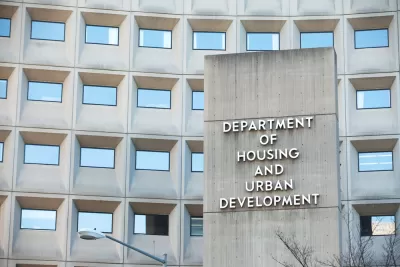As the housing crisis rages on, the housing assistance infrastructure put in place during the pandemic can provide a model for long-term aid programs.

"As the pandemic surged across America, Congress and the White House made available more than $75 billion to support at-risk renters and homeowners, and even more in flexible relief funds that could be used for housing aid." Gregory Heller, a director and affordable-housing subject matter expert at Guidehouse, argues that the government should use this example to implement similar policies outside the pandemic, treating the housing crisis as a disaster not dissimilar from COVID-19 or natural disasters.
The programs billed as disaster relief put in place during the pandemic showed that it is possible to distribute funds and aid quickly, writes Heller. "Now that we have started to view and respond to America’s housing instability crisis as a disaster, one thing is clear: We cannot go back to the way we funded housing before; otherwise, we’ll simply return to the pre-pandemic status quo."
To Heller, the infrastructure developed around pandemic relief programs provides a powerful opportunity to build on these programs and "recognize that this disaster will not end when the health and economic impacts of the pandemic are behind us." Thus, Heller says, the government should continue to invest in and strengthen infrastructure and programs that address housing instability.
FULL STORY: America’s Housing Crisis Is a Disaster. Let’s Treat It Like One.

Maui's Vacation Rental Debate Turns Ugly
Verbal attacks, misinformation campaigns and fistfights plague a high-stakes debate to convert thousands of vacation rentals into long-term housing.

Planetizen Federal Action Tracker
A weekly monitor of how Trump’s orders and actions are impacting planners and planning in America.

In Urban Planning, AI Prompting Could be the New Design Thinking
Creativity has long been key to great urban design. What if we see AI as our new creative partner?

King County Supportive Housing Program Offers Hope for Unhoused Residents
The county is taking a ‘Housing First’ approach that prioritizes getting people into housing, then offering wraparound supportive services.

Researchers Use AI to Get Clearer Picture of US Housing
Analysts are using artificial intelligence to supercharge their research by allowing them to comb through data faster. Though these AI tools can be error prone, they save time and housing researchers are optimistic about the future.

Making Shared Micromobility More Inclusive
Cities and shared mobility system operators can do more to include people with disabilities in planning and operations, per a new report.
Urban Design for Planners 1: Software Tools
This six-course series explores essential urban design concepts using open source software and equips planners with the tools they need to participate fully in the urban design process.
Planning for Universal Design
Learn the tools for implementing Universal Design in planning regulations.
planning NEXT
Appalachian Highlands Housing Partners
Mpact (founded as Rail~Volution)
City of Camden Redevelopment Agency
City of Astoria
City of Portland
City of Laramie





























